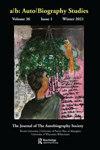Towards a Method of Black Feminist Archival Bricolage: Memory-Keeping within, beneath and beyond the Archive
Q1 Arts and Humanities
引用次数: 0
Abstract
Abstract This essay considers the erasure and visceral laceration of Black women’s herstories from white, masculinized archives, timelines, and cartographies of the past. It simultaneously centers the identity-oriented and historically anchored ways everyday Black women collect, curate, and pass down personal archives for the purpose of intergenerational survival and uplift. In centering the life writings and oral narratives of three Black women in the author’s immediate family, this essay disrupts archival silences around the movements, mobilities, and resistance strategies of everyday Black women; rather, it reveals how Black grandmothers, mothers, and othermothers continue to sustain Black women’s viability and visibility through their work as memory-keepers and family historians. By centering the life herstories of her grandmother, mother, and aunt, the author engages in a process of Black feminist archival bricolage, weaving together fragmented pieces of distinct yet overlapping life narratives that—when put together—tell a more complete and complex story of Black women’s movements, resistances, and archival pedagogies. In doing so, archival fissures are collaboratively challenged in order to reclaim, recover, and recenter the invisible cartographies of everyday Black women.走向黑人女性主义档案拼贴的方法:档案内部、档案之下和档案之外的记忆保存
摘要:本文探讨了过去白人、男性化的档案、时间线和地图对黑人女性故事的抹除和内心的撕裂。同时,它以身份为导向,以历史为基础,以黑人女性收集、管理和传递个人档案的方式为中心,以实现代际生存和提升。本文以作者直系亲属中三位黑人女性的生活写作和口头叙述为中心,打破了围绕黑人女性日常运动、流动性和抵抗策略的档案沉默;相反,它揭示了黑人祖母、母亲和其他母亲如何通过她们作为记忆保持者和家庭历史学家的工作,继续维持黑人妇女的生存能力和知名度。通过以她的祖母、母亲和姑姑的生平故事为中心,作者参与了黑人女权主义档案的拼凑过程,将支离破碎的截然不同但又重叠的生活叙事编织在一起,当它们放在一起时,讲述了一个关于黑人妇女运动、抵抗和档案教学的更完整、更复杂的故事。在这样做的过程中,为了收回、恢复和重新定位日常黑人女性的隐形地图,档案裂缝受到了合作的挑战。
本文章由计算机程序翻译,如有差异,请以英文原文为准。
求助全文
约1分钟内获得全文
求助全文
来源期刊

a/b: Auto/Biography Studies
Arts and Humanities-Literature and Literary Theory
CiteScore
0.80
自引率
0.00%
发文量
27
期刊介绍:
a /b: Auto/Biography Studies enjoys an international reputation for publishing the highest level of peer-reviewed scholarship in the fields of autobiography, biography, life narrative, and identity studies. a/b draws from a diverse community of global scholars to publish essays that further the scholarly discourse on historic and contemporary auto/biographical narratives. For over thirty years, the journal has pushed ongoing conversations in the field in new directions and charted an innovative path into interdisciplinary and multimodal narrative analysis. The journal accepts submissions of scholarly essays, review essays, and book reviews of critical and theoretical texts as well as proposals for special issues and essay clusters. Submissions are subject to initial appraisal by the editors, and, if found suitable for further consideration, to independent, anonymous peer review.
 求助内容:
求助内容: 应助结果提醒方式:
应助结果提醒方式:


